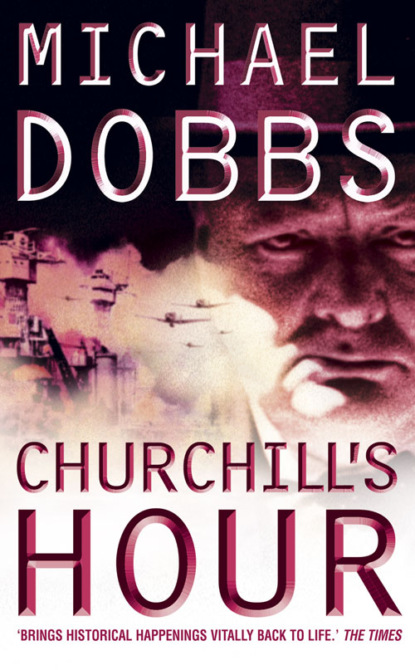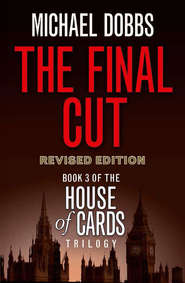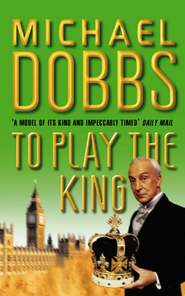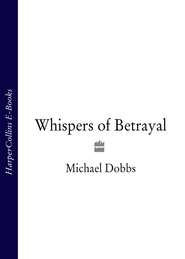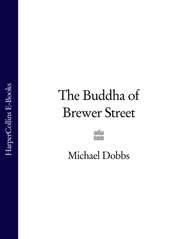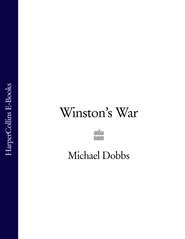По всем вопросам обращайтесь на: info@litportal.ru
(©) 2003-2024.
✖
Churchill’s Hour
Автор
Год написания книги
2019
Настройки чтения
Размер шрифта
Высота строк
Поля
He was playing them like an audience at a music hall.
‘Ah, I am forgetting my manners,’ he said when at last he stepped back. ‘I must introduce you men to my very great friend, Mr Gil Winant. He is the new American Ambassador, which makes him your great friend, too.’
‘Last one wasn’t, was he?’ a voice sounded from the back of the huddle.
‘On the contrary, I was very much attached to him,’ Churchill said, smiling. ‘Like my appendix.’
‘But you ’ad that cut out years ago,’ the voice came back, to general laughter.
‘And you, sir, will get me into a great deal of hot water making baseless accusations like that,’ Churchill replied, grinning broadly.
They cheered him as he stepped into his garden through the hole in the wall. He turned to wave his stick at them. ‘Londoners—are we downhearted?’
‘No!’ they cried as one.
It was a piece of theatre, typical Churchill, the sort of thing he’d made sure his other visitors like Hopkins and Willkie had witnessed. Reality wasn’t as simple as that, of course. For every Londoner who could still summon up the spirit of defiance, there were those who were gradually weakening, being ground down by yet another winter of war. In his heart, Churchill knew they would not go on—couldn’t go on—through another winter unless somehow he could find new hope to sustain them. But he couldn’t even feed them properly. The shipping losses in the Atlantic were enormous and the prospect of starvation still hovered over every meal. He had to give them hope, some taste of victory, not an endless diet of setback and evacuation.
Every week brought a new nightmare and another battlefield. So far the Balkans had remained undisturbed, but it was about to be turned into a slaughterhouse. Hundreds of thousands of German troops were massing to swallow up Yugoslavia and Greece, taking advantage of feuding local leaders who, rather than taking on the Wehrmacht, seemed more intent on fighting each other—‘Cvetkovic, Markovic, Simovic, Subotic and every other damned sonofabitch,’ as Churchill had complained in frustration. Meanwhile a new commander had arrived to breathe fresh life into the German campaign in the North African deserts. Someone called Rommel.
And the Japanese, that unfathomable, unknowable race on the far side of the world—what in damnation were they planning?
His concerns pursued him everywhere, through his days, through his dreams, no matter what he pretended to the bricklayers. By the time he had crossed the garden and reached the back door of Downing Street, they were weighing heavily on his heart once more. He threw open the door and kicked off his shoes.
‘Sawyers! Where are you, man?’ he shouted. ‘Stop hiding and help. Some idiot has poured cement all over my shoes.’
They sat in a small sitting room that was cold and bleak. The curtains were dusty, the windows taped over, some of them cracked, but Churchill still preferred to spend his daylight hours here in 10 Downing Street than entombed in the underground bunker at the nearby Annexe. It was a small reminder of how things used to be.
The American was beginning to warm up and Sawyers hovered attentively, ready to refill his glass. Shy and uncertain as Winant sometimes looked, he was no fool. He had a long and distinguished public career behind him, much of it in New Hampshire, where he had been elected governor three times. They called it the Granite State; evidently they liked the quiet touch.
‘I welcome you to London, Gil, with all my heart. It’s a pity that the medical condition of the President makes it so difficult for him to travel, but that makes your position here of even greater significance. I don’t think it an exaggeration to say that a whole world might depend upon it. It’s one of my great sorrows that I have not yet met Mr Roosevelt, but, in you, I know I have a friend who will bring us together in thought as well as deed. You must be my mirror into his mind.’
The words struck Winant as strange because, of course, Churchill had met Roosevelt, many years before. The old man seemed to have forgotten, but Roosevelt hadn’t. It had been 1918, at an official dinner in London. The occasion hadn’t been an unqualified success; Churchill had been both voluble and a little vulgar, and when Roosevelt returned from the dinner he told his colleagues that Churchill was nothing less than ‘a stinker’. It was a story that Joe Kennedy had paddled all around Washington, and so keenly that Winant was surprised the old man hadn’t been reminded of it. But then, given the nature of the story, it was perhaps no surprise at all.
‘I have very clear instructions, Prime Minister—forgive me: Winston,’ the ambassador said as the valet poured more whisky. ‘The President has instructed me to tell you that we shall do everything within our power to help you win this war.’
‘That is more than I had dared hope—’
‘Short of declaring war ourselves, of course.’
‘Ah.’ Churchill thrust his own glass towards Sawyers.
‘The Lend-Lease Bill will be through Congress in a few days; you know the President’s set to sign it. Soon we’ll be able to send you all those tools you asked for to finish the job.’
The ambassador had intended the words as encouragement, but for a moment Churchill’s expression suggested he’d just smashed his finger with a hammer.
‘You know, Winston, your broadcast came as a profound relief to many Americans. Ridiculous, I know, but there are still those who suspect you of wanting to find some means of getting us involved in another European shooting match.’
A gentle warning shot across the bow. There were many in the United States who still gave kitchen space to tittle-tattle that Churchill was bent on repeating the history of the last war, when a reluctant America had been dragged into the conflict three years after it had started as a result of the sinking of a number of ships by U-boats. The most notable loss had been the passenger ship Lusitania. More than a thousand souls had gone down with her, many of them American, and hundreds of thousands were to follow. Some blamed Churchill personally for this, suggesting he’d as good as arranged the U-boat attack in order to shame the United States out of its isolation. Many Americans still sat round their fires talking of the untrustworthy English.
Churchill stirred uneasily, eager to move on. ‘What of the Far East, Gil? It has been occupying my mind. We cannot rest content while Japan conducts a campaign of slaughter and genocide that is every bit the equal in savagery to Hitler’s.’
‘But in China.’
‘Such savagery never knows its bounds. It will not confine itself to China. Where will it turn to next? To French Indo-China? To the Dutch East Indies? To our own colonies of Hong Kong and Singapore, even India? There are vast riches waiting for them there.’
‘Which is why, presumably, they are already colonies. And why the European powers would fight once more to retain them.’ Winant seemed so much more composed face to face than in front of an audience. And he knew his master’s mind. Churchill decided he would be a most effective ambassador, and was not a man he should underestimate.
‘I must tell you, Gil, in all seriousness, what I have written to the President.’ Churchill turned to his glass, sipping, swirling, as though trying to wash away some foul taste, before staring at the American. ‘I told Mr Roosevelt that if the Japanese were to attack our Far Eastern possessions, we would not have the military capability to resist them. No matter what I might be forced to say in public to shore up the general morale, you and your President must be under no illusion. On our own, we could not win such a war.’
On their own, the British could not win…Little wonder, Winant thought, that the old man was driven to drink.
‘That’s why I have asked the President if he will send some part of the US Pacific Fleet to Singapore,’ Churchill continued. ‘As a sign that an attack on British possessions will not be tolerated. No words, no great declaration, no threats, just a symbolic gesture that even the Japanese will understand. A few American ships in Singapore could prevent the outbreak of the most terrifying tempest across the whole of the Far East.’
‘I’m afraid the President can’t agree to that, Winston,’ Winant said quietly, as though the softness of his voice might in some way diminish the force he knew his words would have on Churchill.
‘But…’ For the briefest of moments Churchill paused, buried beneath the weight of his disappointment. ‘My dear Gil, I’m not talking of a vast armada, only a few ships, even a couple of rust buckets would do, so long as they fly the Stars and Stripes…’
‘I’m sorry.’
‘It could prevent catastrophe—’
‘Our commitment is to Britain, not to its colonies. I think Mr Roosevelt would argue—and with considerable force—that it’s not the job of the United States to steam around the world shoring up other people’s empires. We don’t like empire, no matter whose flag it flies.’
That was Roosevelt speaking. The President came from a long line of radicals and revolutionaries; he loathed all empires and the British Empire as much as any—a kingdom of pigsticking and polo, he’d been heard to call it. There was no way he was going to shed American blood for that.
Churchill couldn’t afford to be diverted. ‘But if the Japanese were to control the whole of the Far East they would become the most mighty power in the Pacific. Surely America could not tolerate that?’
‘The Pacific is even wider than the Atlantic, Winston—and one hell of a long way from the Hudson.’
‘In his State of the Union Address only a few weeks ago your President spoke of his ambition to lead the world from fear.’
‘And you know what he also said to me, Winston? That the most terrifying thing in the world is to be a leader who looks over his shoulder and finds no one there.’ Winant leant forward from his armchair, as though trying to close the distance between them. ‘He hears you, Winston. But he also has to listen to the American people who are suspicious of everything to do with this war. You know, all the while Congress has been debating Lend-Lease, women have been marching outside carrying banners accusing the President of wanting to murder their sons. That hurt him, down deep. They even hanged his effigy. There’s a lot of steam behind the no-war protests, Winston, they don’t want any more American boys to die in Europe or anywhere else. Their voices are powerful. And Mr Roosevelt has had to listen.’
‘Public opinion can be a most demanding mistress.’ He did not mean it kindly.
And so they continued, the Englishman and the American, confronting each other, testing each other’s ideas, trying to find common ground but discovering their ambitions were as far apart as the continents from which they came. Churchill rose to his feet, his passion too great to remain seated, and he stood by the pale light of the window, his hand on his brow. It was what he had feared. Roosevelt wouldn’t move, not even an inch. He looked through the window and saw only disaster. If war broke out in the Far East, Britain would lose it, and the shockwaves of defeat would quite overturn Britain’s little boat. It would be the end, but he dare not admit it.
‘What will you do?’ Winant asked.
‘KBO, I suppose,’ Churchill muttered, his jaw jutting forward. ‘Just KBO.’
Winant was taken aback, not knowing what to do or say and having no idea what the old man was talking about.
The moment was broken by the arrival in the room of a young woman. It was Sarah, Churchill’s daughter, who had been visiting her mother. Winant rose, looking strangely like a schoolboy once more, the composure of recent moments vanished as Churchill made the introduction. She was tall, elegant, with a broad, open forehead and Churchill’s blue eyes.
‘Forgive the interruption, Papa,’ she said, kissing his cheek, ‘I’ve come to say goodbye. May I see you at the weekend?’
‘You shall!’ he said, dragging himself back from his broken dreams. ‘And Mr Winant here, too.’ He turned to the American. ‘Gil, you will be our guest at Chequers. You are one of the family now.’





